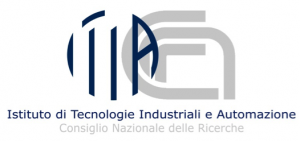

Istituto di Tecnologie Industriali e Automazione – Consiglio Nazionale delle Ricerche
ITIA-CNR
IRAS Group
Description of the Organization/Institution
The Manufacturing sector is a fundamental pillar for the technological progress and for economic and social prosperity of modern countries. Italy plays a primary role in Europe and can rely upon unique resources to preserve and enhance its competitiveness in manufacturing. ITIA-CNR deeply invests in the research, coherently with the European objectives, with the aim of continuously supporting the competitiveness of the manufacturing sector by bringing innovation in the factory. IRAS group is devoted to industrial robotics.
Although robots high flexibility, in terms of motions and programmability, would make them very valuable for SMEs, industrial robots have been mainly developed for large enterprises. SMEs can be supported increasing robots flexibility and ease-of-use, but they still only embody knowledge about their nominal task, with the possible inclusion of sensing as explicitly instructed by a human operator (who has knowledge of the purpose of a particular motion).
Core Expertise
The implementation of more advanced sensing and perception, combined with robust behaviour with respect to unforeseen changes, implies extensive engineering and system integration using current flexible solutions. This, however, is neither desirable nor affordable for a SME. As a new vision, IRAS proposes a new work paradigm, where humans and robotic systems work cooperatively in all phases of the robot life-cycle, using information, interaction devices, information services and other resources in order to manufacture products
for internal or external customers, in which humans and robots can together manage SME manufacturing uncertainties, and in which humans and robotic systems are cooperatively able to learn from each other and to learn from past uncertainty-handling strategies, developing a new kind of industrial robot systems, capable of responding cooperatively, safely, intelligently and largely autonomously to gaps in their knowledge and to situations or contexts that have not been specified in their design.
Portfolio
• EURECA: H2020 CleanSky 2 under grant agreement n. 738039.
• SMEROBOT™: The European Robot Initiative for Strengthening the Competitiveness of SMEs in Manufacturing, EU FP6-NMP (2005-2009).
• HYFLEXAIS: Hyperflexible And Autonomous Industrial Robot System, Regione Lombardia – Cooperazione Scientifica Internazionale (2010-2011).
• ROBOFOOT: Smart robotics for high added value footwear industry, EU FP7 (2010-2013). ACTIVE: Active Constraints Technologies for Ill-defined or Volatile Environments, EU FP7-NMP (2011-2015).
• FLEXPROD: Sistemi di produzione flessibili ed eco-efficienti per veicoli su gomma, Ministero per lo Sviluppo Economico (2012-2015).
• SMEROBOT™: The European Robot Initiative for Strengthening the Competitiveness of SMEs in Manufacturing, EU FP6-NMP (2005-2009).
• HYFLEXAIS: Hyperflexible And Autonomous Industrial Robot System, Regione Lombardia – Cooperazione Scientifica Internazionale (2010-2011).
• ROBOFOOT: Smart robotics for high added value footwear industry, EU FP7 (2010-2013). ACTIVE: Active Constraints Technologies for Ill-defined or Volatile Environments, EU FP7-NMP (2011-2015).
• FLEXPROD: Sistemi di produzione flessibili ed eco-efficienti per veicoli su gomma, Ministero per lo Sviluppo Economico (2012-2015).
• FLEXICAST: Robust and FLEXIble CAST iron manufacturing, EU FP7-FoF (2012-2016) SUSTAINABLE MANUFACTURING: Cluster Fabbrica Intelligente, Cluster Tecnologici Nazionali, Ministero dell’Istruzione, dell’Università e della Ricerca (2013-2016).
• RIPRENDO@HOME: Recupero post-Ictus: Piattaforma per la RiabilitazionE Neuromotoria orientata al Domicilio, Accordo Quadro di collaborazione tra Regione Lombardia e il Consiglio Nazionale delle Ricerche (CNR) (2013-2016).
• RIPRENDO@HOME: Recupero post-Ictus: Piattaforma per la RiabilitazionE Neuromotoria orientata al Domicilio, Accordo Quadro di collaborazione tra Regione Lombardia e il Consiglio Nazionale delle Ricerche (CNR) (2013-2016).
Areas of Application
IRAS develops technologies for effective, robust and safe robot-environment and robot-human interaction. The integration of sensorial information into behavioral models and controls of robot systems enables the intuitive, robust and flexible use of robots in context-aware applications and a natural, transparent and furthermore safe workspace sharing.
Interaction control strategies for automatic assembly processes characterized by geometries, materials and tolerances that are not known a priori.
Clinical Trial for RehaMSR – Rehabilitation Multisensory Room (RehaMSR) natively designed for upper-limb robot-assisted rehabilitation – developed in cooperation with Ospedale Valduce. The system integrates several devices for multi-sensorial feedback. The platform is used by medical personnel to both investigate human neuromotor behaviours and to assess innovative rehabilitation protocols.
Contact
Istituto di Tecnologie Industriali e Automazione – Consiglio Nazionale delle Ricerche
ITIA-CNR
Via Alfonso Corti 12
20133, Milano | Italy
PhD Nicola Pedrocchi
Phone: +39 02 2369 9625
Fax: +39 02 2369 9915
E-mail: nicola.pedrocchi@itia.cnr.it
Link to website
Project Description:
EURECA
